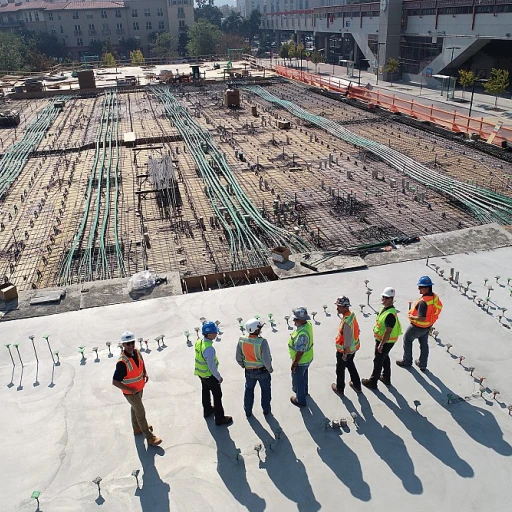
Understanding the Role of Communication in Performance Reviews
Significance of Communication in Enhancing Performance Evaluations
Effective communication plays a pivotal role in the success of performance reviews, aiding in providing clear feedback, aligning team members on goals, and ensuring expectations are understood. When communication is prioritized, it fosters a work environment where team members feel valued and understood, ultimately driving employee performance and engagement. One of the central challenges in employee appraisals is conveying feedback that is both constructive and positive. Communication skills such as active listening and the use of specific review phrases can greatly enhance the quality of these discussions. This process requires a well-established communication style that can address areas of improvement and highlight where an employee exceeds expectations. Furthermore, clear communication during performance reviews sets a foundation for problem solving and decision making. By addressing comments and aligning tasks with organizational goals, team members can effectively manage their responsibilities, contributing to a more productive work atmosphere. Incorporating feedback consistently within the performance management process not only improves individual assessments but also supports a broader organizational strategy to meet high performance standards. Setting time aside for regular feedback sessions can significantly impact work-life balance, fostering a culture where employees can thrive and continuously improve. For a deeper understanding of how communication dovetails with performance management systems, you may explore this article exploring the difference between development and performance management. This resource offers comprehensive insights into effectively managing and utilizing feedback within organizations.Common Communication Barriers in the Workplace
Identifying and Overcoming Workplace Communication Obstacles
Effective communication is crucial for any successful performance review, yet numerous common barriers often stand in the way of achieving this goal. Understanding these obstacles can significantly enhance communication skills and improve the overall work environment. First, organizational culture can heavily influence communication style. In some settings, open dialogue is encouraged, while in others, hierarchical structures might limit open exchange. This disparity can cause misinterpretation of feedback, with phrases intended as constructive feedback potentially being perceived as negative comments. Recognizing the impact of workplace culture helps in crafting effective communication strategies. To gain a deeper understanding of workplace culture's role, explore our article on the language of workplace culture. Another prevalent barrier is the confusion around expectations. When there is a lack of clarity in expectations, both employees and managers struggle to provide quality work feedback. Consistently misaligned expectations can result in poor employee performance reviews, where team members may feel they did not exceed expectations despite high performance. Establishing consistent and clear objectives helps teams manage time effectively and supports quality performance management. Additionally, varying communication skills across team members can affect the effectiveness of performance appraisals. Employees and managers alike may encounter difficulty in active listening or sharing ideas fluently. Without honing these skills, performance review discussions can become unproductive, failing to identify areas for improvement or celebrate successes. In essence, overcoming these communication barriers requires continuous problem solving and a commitment to positive, open dialogue. It involves nurturing an environment where constructive feedback is welcomed, and review comments are approached with a mindset of growth and improvement.Techniques to Improve Communication Skills
Exploring Techniques to Enhance Communication Skills
Improving communication skills is crucial for ensuring effective performance reviews. A strong focus on enhancing these skills can lead to a more productive and positive work environment. Here, we'll explore various techniques that can be employed to improve communication among team members, ultimately contributing to better performance reviews. First and foremost, active listening is an essential component. It is vital to consistently engage with communication, not just verbally, but through non-verbal cues as well. Active listening involves understanding and responding to what your team is communicating, which can lead to better feedback and a clearer understanding of expectations. High-quality work often stems from clarity—something that effective communication can enhance. Encouraging open and honest feedback is another strategy worth implementing. Providing a platform for team members to share their ideas and comments can lead to a more collaborative and innovative approach to tasks. Constructive feedback significantly contributes to identifying areas for improvement while nurturing employee performance to exceed expectations. Effective decision-making requires a clear and well-defined communication style. Utilizing performance appraisal techniques ensures that communication remains consistent and aligned with the overall goals of performance management. When feedback becomes a two-way street, both supervisors and employees benefit from work environment improvements. To facilitate communication that boosts performance reviews, relying on specific review phrases can be advantageous. These phrases offer concrete examples of communication skills and expectations. For instance, managers might use phrases like “demonstrates excellent problem-solving skills” or “meets deadlines with effective time management.” Such examples provide employees with a clear understanding of their high points as well as areas needing focus, thus steering them towards improvement. Lastly, integrating regular performance discussions into the workflow can keep communication fluid and consistent. Having ongoing reviews allows for timely feedback, adjusting tasks, and ensuring expectations remain aligned. This practice supports maintaining a work-life balance, as employees are less pressured and more engaged and motivated to perform well. For an in-depth understanding of how communication intertwined with team-building strategies can enhance the balance between work and life, the role of team building can be a valuable resource.The Impact of Effective Communication on Work-Life Balance
Enhancing Business Relationships through Effective Conversations
The importance of communication in performance reviews cannot be overstated, as it plays a crucial role in maintaining a balanced work-life environment. Effective communication during these reviews not only helps in setting clear expectations but also assists employees in understanding their roles and how their tasks fit into the broader team objectives. A seamless communication style contributes to a more positive work environment by facilitating active listening and constructive feedback. When team members feel heard and valued, it improves their morale, leading to high-quality work production. This positivity, in turn, affects the overall performance of the team and, ultimately, the success of the organization. Moreover, effective communication skills are essential for providing clear and understandable feedback. Utilizing specific phrases and examples helps in highlighting areas of improvement, ensuring that feedback is both constructive and actionable. Consistently applying these techniques encourages an environment where employees want to exceed expectations. Performance reviews should also be a platform for decision making and problem solving. By fostering open communication, team members feel empowered to share ideas and suggestions for improvement, promoting innovation and resilience. Investing time in developing communication skills benefits both individual employees and the organization as a whole. Engaging in effective conversations during performance reviews can lead to more engaged and motivated employees, better performance management, and a well-balanced team dynamic.Real-Life Examples of Successful Communication in Performance Reviews
Illustrations of Effective Communication in Performance Reviews
The impact of constructive communication is profound when examining real-life examples in performance discussions. Through these illustrations, the principles of addressing communication barriers and enhancing skills come to life, offering a blueprint for fostering a supportive work environment and driving quality output. One example is a tech company that notably improved their team's performance by consistently using positive communication in their reviews. By actively listening to employees and incorporating example phrases like "Your problem-solving skills consistently exceed expectations," they promoted a culture where team members felt valued and empowered to share new ideas. As a result, employees took ownership of their tasks, leading to an uptick in decision-making capabilities and overall employee performance. In another instance, a retail organization tackled communication barriers by introducing structured feedback mechanisms. They adopted techniques such as open-ended questions and tailored review phrases to better align employee expectations with company goals. This approach not only facilitated personal growth but also significantly improved performance appraisals by providing clarity in areas requiring improvement. A healthcare facility successfully employed coaching strategies to bridge the communication gap in their high-stakes environment. They emphasized time management and used specific review comments to address performance areas. For example, by highlighting "consistently meeting tight deadlines," they reinforced positive behaviors while providing constructive feedback to help team members adapt their communication style. Overall, these examples illustrate how effective communication during performance reviews can significantly shape employee interactions and improve workplace productivity.Resources and Tools for Developing Communication Skills
Resources to Strengthen Communication in Performance Reviews
In any workplace setting, consistently enhancing communication skills is pivotal for improving employee performance and ensuring a constructive work environment. Here are some reliable resources and tools that can aid in developing and honing these skills effectively.
- Workshops and Training Programs: Participating in dedicated training programs focusing on performance management and communication offers diverse insights into effective team collaboration. These sessions often highlight problem-solving, decision-making, and time management, which are crucial areas for improvement.
- Webinars and Online Courses: Access various online platforms that provide courses on communication styles and skills development. These can be beneficial for employees striving to exceed expectations in performance reviews.
- Books and Articles: Reading material on communication tactics and feedback techniques can help you learn example phrases and approaches that foster high-quality work interactions.
- Feedback Mechanisms: Utilize tools that facilitate feedback collection from team members and managers. These tools help communicate expectations clearly and encourage positive, consistent interactions.
- Active Listening Workshops: Consider workshops that are specially tailored to improve active listening skills. This will enable employees to better interpret review comments and align their tasks with organizational objectives.
- Meditation and Mindfulness Apps: Apps focused on mindfulness can reduce workplace stress and enhance empathetic communication, leading to more effective and constructive reviews.
By leveraging these resources, you can nurture a work culture where effective communication thrives, ultimately contributing to better performance reviews and a positive team environment.













